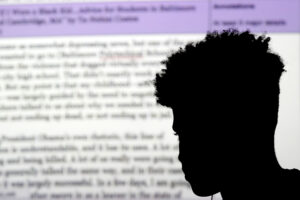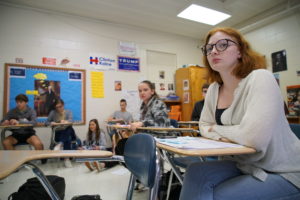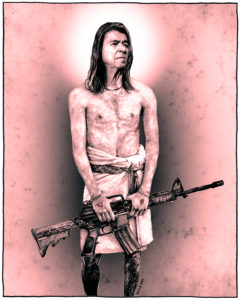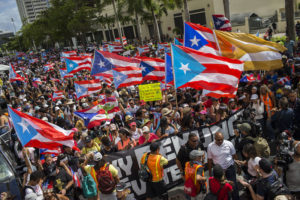Amid School Closures, Puerto Rico’s Teachers Fight Privatization
Teachers in the U.S. territory worry that its education department will exploit a plunge in enrollment to push charter schools and a voucher program. Children discuss Hurricane Maria at Ramon Marin Sola Elementary School in Guaynabo, Puerto Rico, in October. (Carlos Giusti / AP)
Children discuss Hurricane Maria at Ramon Marin Sola Elementary School in Guaynabo, Puerto Rico, in October. (Carlos Giusti / AP)
Puerto Rico’s Department of Education announced Thursday it will close 283 schools this summer after a sharp drop in enrollment, thought to be partly a result of displacement of families after Hurricane Maria. However, many teachers in the island’s school system say the issue might be more complicated and believe the system’s recent acceptance of charter schools and voucher programs could be contributing to the deprioritizing of public schools.
The Associated Press reports that Puerto Rico is currently operating 1,100 public schools with 319,000 enrolled students.
Puerto Rico’s Education Secretary Julia Keleher said of the closings, “We know it’s a difficult and painful process. For this reason, we’ve done it in the most sensible way, taking in consideration all the elements that could impact the daily lives of some families and the school communities in general. … Our boys and girls deserve the best education that we are capable of giving them, taking into account the fiscal reality of Puerto Rico.”
CNN continues:
Before Hurricane Maria hit Puerto Rico on September 20, there already was an unprecedented migration from the Caribbean island to the mainland United States — at least in part because of the US commonwealth’s financial crisis.
The hurricane left millions of Puerto Ricans without power or running water. Schools were closed and jobs lost. Puerto Ricans are American citizens and can move to the states without visas or other paperwork. And so, many did. In 2016, there were about 2 million more Puerto Ricans living in the mainland United States than in the US territory.
Some critics have voiced concern that public school closures are being used as cover for a total overhaul of Puerto Rico’s education system. Lawmakers and the island’s governor recently approved legislation to allow charter schools and voucher programs throughout the territory, and in response, a teachers union filed a lawsuit aiming to stop the island from further privatizing its school system. Education Week reports:
…the union has argued that taken together, the new law and separate fiscal reforms will cost teachers jobs, hurt students, and dismember the island’s public education system, which currently serves about 320,000 students.
“To say charters are public schools when they are going to be administered, directed and controlled by private hands is clearly an illegal and unconstitutional contradiction,” union President Aida Diaz told the AP.
In tweets discussing their suit, the union referred to charters as “vultures” and said that the law would privatize public education on the island.
Diaz, whose union represents some 30,000 teachers, said in a statement to the Associated Press, “The damage that the Secretary of Education is doing to children, youth and their parents is immeasurable.”
Teachers opposing the closures have expressed concerns about, among other issues, transportation and special needs children. According to The Associated Press, an estimated 30 percent of Puerto Rican students receive specialized education, about twice the average on the U.S. mainland.
Edwin Morales, who heads a teachers union, was arrested after breaking into the Education Department building to ask questions about the decision to allow charter schools and vouchers. According to PBS NewsHour, Morales says Hurricane Maria is being used as a pretext to replace the public system with charter schools and introduce private investment to education. He said, “We are talking about vouchers. We are talking about charter schools. We are talking about the possibility of firing teachers that, for us as a union, doesn’t help the island to recover.”
Puerto Rican education officials have been seeking input from the U.S. mainland on how to implement charter schools. Robert Enlow, president of EdChoice, a charter school advocacy organization, said, “We’re trying to help them understand what’s been going on in other states, how states have run [choice programs], what the rules are, what the benefits and the challenges have been.”
Your support matters…Independent journalism is under threat and overshadowed by heavily funded mainstream media.
You can help level the playing field. Become a member.
Your tax-deductible contribution keeps us digging beneath the headlines to give you thought-provoking, investigative reporting and analysis that unearths what's really happening- without compromise.
Give today to support our courageous, independent journalists.









You need to be a supporter to comment.
There are currently no responses to this article.
Be the first to respond.